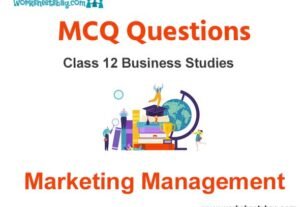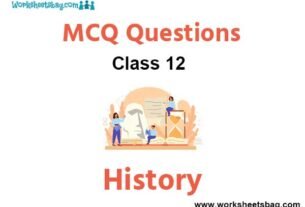Please refer to Government Budget and Economy MCQ Questions Class 12 Economics below. These MCQ questions for Class 12 Economics with answers have been designed as per the latest NCERT, CBSE books, and syllabus issued for the current academic year. These objective questions for Government Budget and Economy will help you to prepare for the exams and get more marks.
Government Budget and Economy MCQ Questions Class 12 Economics
Please see solved MCQ Questions for Government Budget and Economy in Class 12 Economics. All questions and answers have been prepared by expert faculty of standard 12 based on the latest examination guidelines.
MCQ Questions Class 12 Economics Government Budget and Economy
Question. Progressive tax is a tax which is :
(a) Charged at a decreasing rate when income of the individual increases
(b) Charged at a increasing rate when income of the individual increases
(c) A fixed percentage of an individual income
(d) None of these
Answer
B
Question.Capital receipt is that receipt of the government which:
(a) creates a liability
(b) reduces the assets
(c) both (a) and (b)
(d) neither la) nor (b)
Answer
C
Question. Which of the following is/are implication/s of fiscal deficit?
(a) Erosion of government credibility
(b) Inflationary spiral
(c) national debts for future generation
(d) none of these
Answer
D
Question. Regressive tax is a tax which is :
(a)Charged at a increasing rate when income of the individual increases
(b)Charged at a decreasing rate when income of the individual increases
(c)Relatively a low percentage of an individual’s income
(d)None of these
Answer
B
Question.Tax is imposed on value added at the various stages of production is known as:
(a) Corporate profit tax
(b) direct personal tax
(c) value added tax
(d) none of these
Answer
C
Question. Which of the following is an indirect tax?
(a) Wealth tax
(b) Excise tax
(c) income tax
(d) none of these
Answer
B
Question. In the context of government budget, which of the following statements is correct?
(a) Budget is a statement of expected annual receipts and expenditures of the government
(b) It is the detail of actual receipts and expenditures of the government in a financial year
(c) It offers a detailed description of achievements of the government during the five year plans
(d) It indicates BoP status of the domestic economy
Answer
A
Question. Which of the following are the objectives of government budget?
(a) Redistribution of income wealth
(b) Economic stability
( c) GDP growth
(d) all of these
Answer
D
Question. Which of the following is a direct tax?
(a) income tax
(b)Excise tax
(c) sales tax
(d) custom duty
Answer
A
Question.Taxes like wealth and gift tax in India which carry their significance in terms of revenue yield are called:
(a) Indirect tax
(b) direct tax
(c) value added tax
(d) paper taxes
Answer
D
Question. A budget is a balanced one when:
(a) Total expenditure = Total receipts
(b) Total expenditure< Total receipts
(c) Total expenditure > Total receipts
(d) none of these
Answer
A
Question. Tax, the impact of which lies on the person on whom it is legally imposed, is known as:
(a) Indirect tax
(b) direct tax
(c) value added tax
(d) none of these
Answer
B
Question. Deficit budget refers to that situation in which government’s budget expenditure is:
(a) less than its budget receipts
(b) more than its budget receipts
(c) equal to its budget receipts
(d) none of these
Answer
B
Question. A tax, the burden of which can be shifted to others, is called:
(a) Indirect tax
(b) direct tax
(c) wealth tax
(d) none of these
Answer
A
Question.Tax, the impact of which lies on the person on whom it is legally imposed, is known as:
(a) Indirect tax
(b) direct tax
(c) value added tax
(d) none of these
Answer
B
Question. Which of the following is a non-tax receipt?
(a) Fees
(b) Fines
(c) gift tax
(d) grants and donations
Answer
C
Question. Fiscal Deficit=
(a) Total expenditure – Total receipts other than borrowing
(b) Revenue expenditure – Revenue receipts
(c) Capital expenditure Capital receipts
(d) Revenue expenditure + Capital expenditure – Revenue receipts
Answer
A
Question. Capital expenditure is that estimated expenditure of the government by which:
(a) assets are increased
(b) liability is decreased
(c)both (a) and (b)
(d) assets and liabilities do not change
Answer
C
Question. Surplus budget is that budget wherein:
(a) Estimated revenue of the government <Estimated expenditure of the government
(b) Estimated revenue of the government > Estimated expenditure of the government
(c) Estimated revenue of the government= Estimated expenditure of the government
(d) none of these
Answer
B
Question. The difference between fiscal deficit and interest payment is called:
(a) revenue deficit
(b) primary deficit
(c) budget deficit
(d) capital deficit
Answer
B
Question. In which of the following ways, can deficit in budget be financed?
(a) Borrowing from RBI
(b) Borrowing from the public
(c) both (a) and (b)
(d) Neither (a) nor (b)
Answer
C
Question. Which of the following are capital receipts of the government?
(a) Recovery of loans
(b) Borrowings
(c) Disinvestment
(d) All of these
Answer
D
Question. Which of the following is a part of the revenue expenditure in the Indian Government budget
(a) Interest payments
(b) Defence purchases all of these
(c) Wage bill of the government
(d) all of these
Answer
D
Question. Which of the following is a non-tax receipt?
(a) Gift tax
(b) sales tax
(c) donations
(d) Excise duty
Answer
C
Question. As an agreement with WHO conventions, India distributed free covid 19 vaccines to many third-world countries. Which of the following type of expenditure is this?
(a) Revenue expenditure
(b) Capital Expenditure
(c) Both (a) and (b)
(d) Neither (a) nor (b)
Answer
A
Question. The budget may include:
(a) Revenue Deficit
(b) Fiscal Deficit
(c) Primary Deficit
(d) All of these
Answer
D
Question. Which of the following is not a revenue receipt?
(a) Recovery of Loans
(b) Foreign Grants
(c) Profits of Public Enterprise
(d) Wealth Tax
Answer
A
Question. Choose the correct statement given below about demonetization announced on 8th November, 2016.
(a) Government removed the legal tender status of the existing currency notes.
(b) Central government made existing currency notes a limited legal tender.
(c) It reduced the purchasing power of existing currency notes
(d) All of the above
Answer
D
Question. Dis-investment by the government refers to
(a) Selling of fixed capital assets by government
(b) Selling of plants of government
(c) Selling of share of PSUs
(d) Selling of buildings and shares of government
Answer
C
Question. Financial Year in India is :
(a) April I to March 31
(b) January 1 to December 31
(c) October 1 to September 30
(d) None of the above
Answer
A
Question. Street light is an example of __ good.
(a) Private
(b) government
(c) public
(d) None of these
Answer
C
Question. ______ is not an example of non-tax revenue from below:
(a) Excise duty
(b) Penalties
(c) Fees
(d) Both (a) and (b)
Answer
A
Question. Which of the following is not an objective of the government budget?
(a) Reducing inequality of income and wealth
(b) Full employment
(c) Economic growth
(d) Reallocation of resources
Answer
B
Question. Which is a revenue receipt of the government.
(a) Funds raised by the government by issuing National Saving Certificates
(b) Sale of 40% shares of a public sector undertaking to private enterprises.
(c) Amount borrowed from Japan for construction of Bullet Train
(d) Profits of LIC, a public enterprise
Answer
D
Question. The capital receipt is that receipt of the government which:
(a) Creates a liability
(b) reduces the assets
(c) both (a) and (b)
(d) neither (a) nor (b)
Answer
A
Question. If the primary deficit is ₹ 3,500 and interest payment is ₹ 500, then fiscal deficit is:
(a) ₹2,900
(b) ₹4,200
(c) ₹4,100
(d) ₹4,000
Answer
D
Question. Interest payments, defense services expenditure, subsidies, salaries, and pensions are the main items of __ of the government. (plan expenditure/non-plan expenditure)
(a) Revenue expenditure
(b) Capital expenditure
(c) Plan expenditure
(d) Non-Plan expenditure
Answer
A.D
Question. Which of the following is not a characteristic of public goods?
(a) The consumption of public goods by several individuals is rivalrous.
(b) It is difficult and sometimes impossible to collect fees for the public goods.
(c) Public goods are non-excludable
(d) None of the above
Answer
A
Question. The government budget has a revenue deficit. This gets financed by:
a) Borrowing
b) Disinvestment
c) Tax Revenue
d) Indirect taxes
Options:
(a) A and D
(b) C and D
(c) A and B
(d) C and B
Answer
A
Question. Assertion (a): The construction of flyovers is a revenue expenditure of the government.
Reason (R): Capital expenditure leads to the creation of physical assets of the government.
Alternatives:
(a) Both Assertion (a) and Reason (R) are true and Reason (R) is the correct explanation of Assertion (a).
(b) Both Assertion((a) and Reason (R) are true and Reason (R) is not the correct explanation of Assertion (a).
(c) Assertion (a) is true but Reason (R) is False
(d) Assertion((a) is False but Reason (R) is true.
Answer
D
Question. Assertion (a): Profits of public sector undertakings is revenue receipt.
Reason (R): Revenue Receipts are regular and recurring in nature.
Alternatives:
(a) Both Assertion ((a) and Reason (R) are true and Reason (R) is the correct explanation of Assertion (a).
(b) Both Assertion ((a) and Reason (R) are true and Reason (R) is not the correct explanation of Assertion (a).
(c) Assertion (a) is true but Reason (R) is False
(d) Assertion (a) is False but Reason (R) is true.
Answer
A


